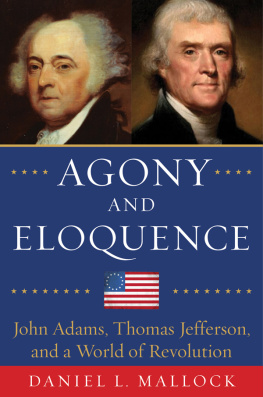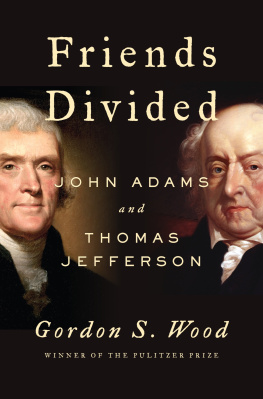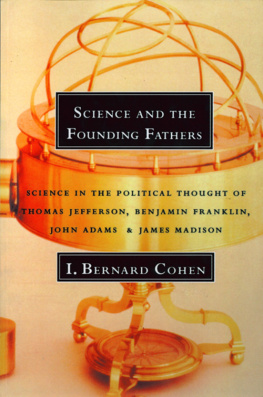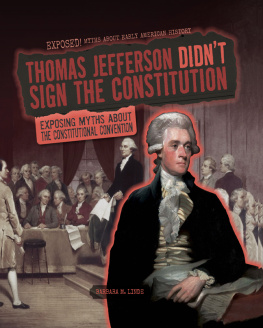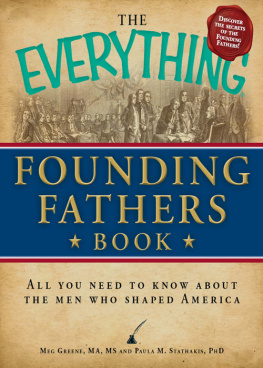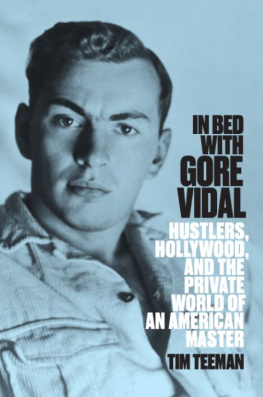Inventing a Nation
Inventing a Nation
Washington,
Adams,
Jefferson
Gore Vidal

Copyright 2003 by Gore Vidal. All rights reserved.
This book may not be reproduced, in whole or in part, including illustrations, in any form (beyond that copying permitted by Sections 107 and 108 of the U.S. Copyright Law and except by reviewers for the public press), without written permission from the publishers.
Designed by Rebecca Gibb. Set in Janson type by Integrated Publishing Solutions, Grand Rapids, Michigan. Printed in the United States of America by R. R. Donnelley, Harrisonburg, Virginia.
The Library of Congress has cataloged the hardcover edition as follows:
Vidal, Gore, 1925
Inventing a nation : Washington, Adams, Jefferson / Gore Vidal
p. cm.
Includes index.
ISBN 0300101716 (alk. paper)
1. United StatesPolitics and government17751783. 2. United States
Politics and government17831809. 3. StatesmenUnited StatesBiography.
4. Washington, George, 17321799. 5. Adams, John, 17351826. 6. Jefferson,
Thomas, 17431826. I. Title.
E302.1.V57 2003
973.40922dc22
2003015612
ISBN 9780300105926 (pbk.)
A catalogue record for this book is available from the British Library.
10 9 8 7 6 5 4 3 2
Inventing a Nation
One
In the fall of 1786 the fifty-four-year-old president of the Potomac Company, George Washington, late commander in chief of the American army (resigned December 23, 1783, after eight years of active duty) was seriously broke. Majestically, he had refused any salary from the revolutionary American government so seldom in useful Congress assembled. But it had always been agreed that should their cause be victorious, Congress would pay the Generals expenses, which it did, with some awe at Washingtons meticulous bookkeeping and lavish way of lifeCongress had to cough up $100,000.
Now the General was retired to his Virginia plantation, Mount Vernon. Despite one hundred slaves, Mount Vernon yielded insufficient revenue, while various western lands on the Ohio River were costing the General more than they brought in. Worse, since he was the worlds most famous man he was also the most visited at home by both countrymen and wide-eyed Europeans. He was an indulgent host; unfortunately, neither his wealth nor that of his wife, Martha Custis, could pay for so royal a way of life. At one point, he seriously considered retreating north to Niagara; if that did not keep his admirers at bay, he was willing to flee even farther into Canada in order to escape his expensive fame. But a few trips away from Mount Vernon made it clear that there was to be no escape for him anywhere; he was to be famous for life and, probably, for all he knew or suspected, thereafter. Glumly he wrote, My living under the best economy I can use must unavoidably be expensive. Plainly, Mount Vernon was to be a well-resorted tavern, [frequented by] any strangers who are going from North to South or from South to North. Yet his crops were sparse. Bad soil. Too little fertilizer. He needed to be, he complained, Midas-like, one who can convert everything he touches into manure as the first transmutation towards gold.
Reluctantly (apparent reluctance was his style whenever something desirable came his way), Washington had accepted the presidency of a joint Virginia-Maryland company to develop the navigability of the Potomac Riverthe so-called River of Swansupon whose bank sat Mount Vernon itself. In early 1785 Washington was offered valuable shares in the company for himself and his heirs. He accepted only with the proviso that he might give whatever dividends that came his way to charities. This letter of stern condition became, as intended, the most highly publicized part of the legislatures official grant. The ongoing, self-nurtured image of Washington as a modest and even selfless hero had made him for sixteen years the iconictodays overused wordcenter of the worlds stage. When word spread that he had refused the kingship of the newly founded American Union, an astonished King George III noted that if this story was true, He will be the greatest man in the world. The story was, we are told, true; and so he was. Others felt that he had been tempted but for two things: for George III to be succeeded by George IV (or even I) had a slightly surreal, even retrogressive ring to it: finally, there was no heir, no Prince of Virginia plotting in Tidewater, prey to chiggers.
Before 1789 the thirteen former British colonies were held uneasily together by certain fraying Articles of Confederation. Like the squire of Mount Vernon, most of the States were now broke, and it seemed impossible for the weak Confederation to raise sufficient revenues to pay off the interest and principal of the debt incurred during eight years of war. What to do? On February 28, 1785, a worried Washington wrote the Confederations secretary for war, Henry Knox, that in the absence of a serious federal government, we are no more than a rope of sand, and shall as easily be broken. When fellow Southerners warned that a stronger Union would mean New Englands tyranny over the South, Washington wrote, If we are afraid to trust one another under qualified powers, there is an end of the Union.
The question pending was by whom and to what end were the powers of such a Confederation or Union to be qualified.
Washington knew that something would have to be done more soon than late to strengthen the Articles of Confederation: others agreed. Immediately, there was a division between those eager for a new centralized federal arrangement and those who wanted the States to be only loosely affiliated. The first group became known as Federalists; the second, as supporters of states rights, were Anti-Federalists, later to be known as Republicans. The first were mostly men who had made their mark in the Revolution; they were young; they tended to be lawyers, a new aristocracyat least that was how they were regarded in New York, Boston, and Philadelphia. The Republicans were often rural magnates like Patrick Henry of Virginia. Washington, the embodiment of Federalism, was also first among the rural magnates, while the author of the Declaration of Independence, the former governor of Virginia Thomas Jefferson, waswith his famous pursuit of happiness for all but slaves and other untidy human fractionsa focal point for future Republicanism. Happily for the Federalists, as of 1786 Jefferson was the Unions minister to France and so out of range unlike the thin-skinned Washington who, although above the political battle, nevertheless subscribed to ten newspapers not by any means friendly to the president of the Potomac Company, currently under attack for having spent fifteen guineas for a pair of French pheasantsa terrible unpatriotic waste of money. Actually, the birds were a present from Louis XVI, to be delivered by Washingtons old friend and wartime colleague Lafayette. One can imagine a tabloid of today telling its readers, on page six, how fifteen American peasants had been bought by President Chirac.
On May 18, 1786, Washington wrote John Jay, That it is necessary to revise and amend the Articles of Confederation, I entertain no doubt; but what may be the consequences of such an attempt is doubtful yet something must be done, or the fabric must fall, for it certainly is tottering. In September a meeting of representatives from the thirteen States was requested by Virginia to assemble at Annapolis, capital of Maryland. They were instructed to report on the trade and commerce of the United States and nothing more. But a New York delegate, the thirty-two-year-old lawyer Alexander Hamilton, arrived with a three-year-old draft of a constitution in his pocket. Unfortunately, and to Washingtons dismay, only five state delegations showed up, less than a quorum. Undismayed, Hamilton kept busy. He allied himself with the other brilliant delegate, the thirty-five-year-old James Madison of Virginia. Madison and Hamilton were more or less as one for a strong federal government. But it was Madison who had fought in the Virginia legislature for interstate conventions, and now the one at Annapolis proved to be the key. Washingtons anxiety was somewhat mitigated when twelve delegates, headed by Hamilton (Washingtons former military aide), had taken it upon themselves to call for a second assembly to meet the second Monday of the following May, 1787, to review and revise the Articles of Confederation.
Next page

